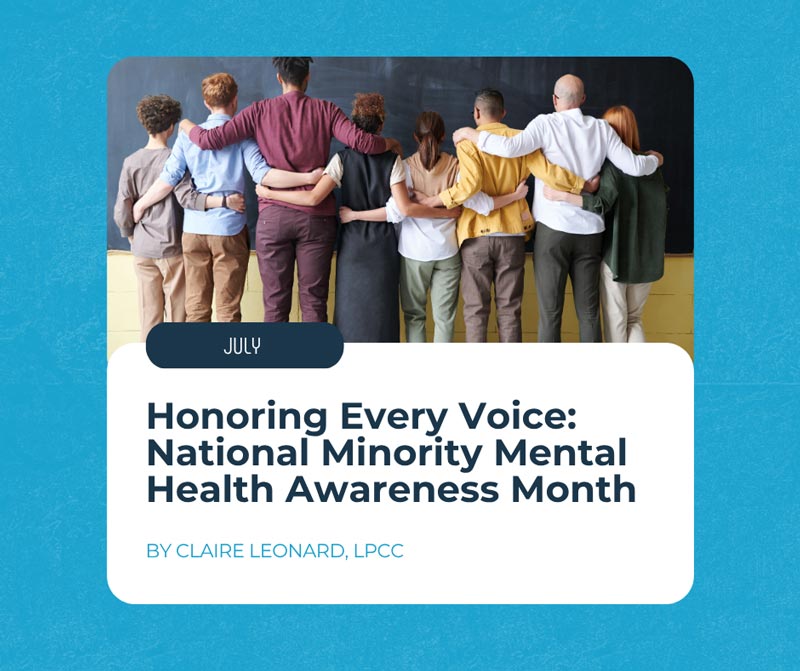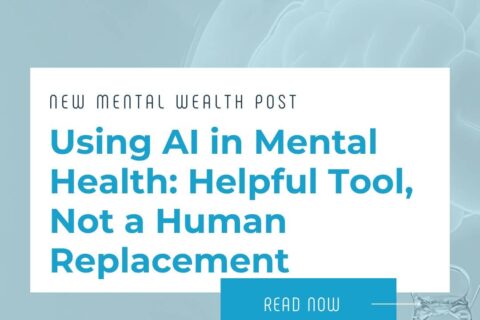Honoring Every Voice: National Minority Mental Health Awareness Month

In today’s cultural climate, mental health care is an integral part of managing various struggles, stressors, and circumstances for the majority of the population. Unfortunately, for many, there are obstacles to receiving necessary care that go beyond basic availability. July is National Minority Mental Health Awareness Month, a time to elevate the experiences of racial and ethnic minority communities and recognize the systemic barriers they face in accessing mental health care. First established in 2008 in honor of mental health advocate Bebe Moore Campbell, this observance encourages us to address stigma, amplify underrepresented voices, and work toward equitable, culturally responsive mental health systems.
The Mental Health Gap
Mental health conditions don’t discriminate—but the access to care, quality of services, and cultural understanding in mental health treatment often do. According to the U.S. Department of Health and Human Services Office of Minority Health:
-
Black and African American adults are 20% more likely to experience serious mental health problems than the general population—but less likely to seek treatment.
-
Asian Americans are the least likely of any racial/ethnic group to access mental health services.
-
Latinx/Hispanic communities face unique challenges related to immigration status, language access, and cultural stigma.
-
Indigenous communities face the highest rates of suicide among all racial/ethnic groups in the U.S.
These disparities stem not just from cultural differences, but also from historical trauma, racism in health systems, language barriers, lack of representation among providers, and inadequate insurance coverage.
Why Representation and Cultural Competence Matter
Too often, therapy and mental health systems are shaped around majority norms. For individuals from minority backgrounds, this can mean:
-
Feeling misunderstood or invisible in therapeutic spaces
-
Being misdiagnosed or underdiagnosed
-
Navigating stigma around mental health within their community
-
Lacking trust in medical institutions due to historical abuses
Culturally competent care means more than translation—it means providers understand, respect, and integrate the values, worldviews, and lived experiences of the people they serve. When clients see providers who look like them, speak their language, or share cultural knowledge, trust grows—and so does healing.
How to Get Involved
National Minority Mental Health Awareness Month is a chance to do more than just raise awareness—it’s a call to action. Whether you’re a mental health professional, community leader, or concerned individual, your voice and actions matter. Here’s how you can make a meaningful impact:
-
Listen and amplify: Share stories, platforms, and resources from diverse voices. Uplift mental health advocates, artists, and thought leaders from BIPOC communities on your social media or in your workplace.
-
Educate yourself and others: Take time to learn about how culture, race, and ethnicity shape mental health experiences. Attend webinars, read books and articles by BIPOC authors, and invite open dialogue in your circles. Host a book club or discussion group on culturally responsive mental health.
-
Support BIPOC-led organizations: Contribute to or partner with nonprofits and community groups doing the hard work of advocacy, outreach, and service delivery in under-resourced communities. Even small donations or volunteer hours can go a long way.
-
Challenge stigma: In many cultures, mental health is still a taboo subject. Normalize conversations about mental wellness within your own family, faith community, or workplace. Speak openly and encourage others to seek support without shame.
-
Advocate for equitable access: Contact local representatives about the need for more mental health funding in marginalized communities. Support policies that improve access to care, increase the number of diverse mental health professionals, and expand insurance coverage for mental health services.
-
Promote workplace inclusion: If you’re in a position of leadership, assess how your workplace supports mental health for employees of all backgrounds. Encourage Employee Assistance Programs (EAPs) to partner with diverse providers and create culturally inclusive wellness initiatives.
-
Be a bridge: Sometimes, just helping someone find a culturally competent therapist or driving them to an appointment can make a difference. Learn how to connect friends, neighbors, or coworkers with local mental health resources.
National Mental Health Resources for BIPOC Communities
Below are some trusted resources designed to help readers of all backgrounds take action, find culturally relevant support, and connect with providers who understand the unique mental health needs of marginalized communities. Whether you’re seeking care for yourself or hoping to support others, these organizations offer a starting point.
-
Therapy for Black Girls
https://www.therapyforblackgirls.com
A directory and podcast dedicated to encouraging the mental wellness of Black women and girls. -
Therapy for Black Men
https://www.therapyforblackmen.org
A space dedicated to reducing the stigma around mental health in Black communities and connecting men to therapists of color. -
The Loveland Foundation
https://thelovelandfoundation.org
Provides financial assistance for Black women and girls to access therapy services. -
Latinx Therapy
https://latinxtherapy.com
A bilingual podcast and therapist directory aimed at breaking the stigma of mental health in the Latinx community. -
Inclusive Therapists
https://www.inclusivetherapists.com
A nationwide directory of therapists who center cultural responsiveness and anti-oppressive practice. -
Asian Mental Health Collective
https://www.asianmhc.org
Builds a supportive community for Asian Americans and Pacific Islanders to explore mental health and find culturally sensitive care. -
National Queer and Trans Therapists of Color Network (NQTTCN)
https://www.nqttcn.com
A healing justice organization that increases access to mental health resources for queer and trans people of color. -
WeRNative – Mental Health Resources for Indigenous Youth
https://www.wernative.org
A comprehensive health resource for Native youth by Native youth, including culturally grounded mental health content. -
NAMI Identity and Cultural Groups
https://www.nami.org/Your-Journey/Identity-and-Cultural-Dimensions
National Alliance on Mental Illness offers culturally specific education and support tools for diverse communities.
Mental health equity means more than parity in numbers—it means dignity, access, and justice for every person, in every community. During National Minority Mental Health Awareness Month, let’s not only reflect—but act. Because mental health is a human right, not a privilege.


